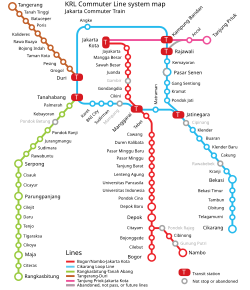KA Commuter Jabodetabek
 |
|||
| Overview | |||
|---|---|---|---|
| Owner | PT Kereta Api Indonesia | ||
| Locale | Jabodetabek (Jakarta Metropolitan Area) | ||
| Transit type | Commuter rail | ||
| Number of lines | 6 | ||
| Number of stations | 78 (8 inactive) | ||
| Daily ridership | 737,030 (2015) | ||
| Annual ridership | 253 million (2015) | ||
| Website | http://www.krl.co.id/ | ||
| Operation | |||
| Began operation | April 6, 1925 (as Dutch Colonial Railways or Staats Spoorwegen); 2000 (under PT Kereta Api, as "Jabotabek Division"); September 15, 2008 (under PT KCJ and current branding) |
||
| Operator(s) | PT KAI Commuter Jabodetabek (KCJ) | ||
| Train length | 4, 8, 10 or 12 cars per trainset | ||
| Headway | 5 - 10 minute(s) | ||
| Technical | |||
| System length | 235 km (146 mi) | ||
| Track gauge | 1,067 mm (3 ft 6 in) | ||
| Electrification | 1,500 V DC overhead catenary | ||
| Average speed | 40 km/h (25 mph) | ||
| Top speed | 90 km/h (55 mph) | ||
|
|||
PT KAI Commuter Jabodetabek, commonly known as Commuterline or KRL (Kereta Rel Listrik, Electric Multiple Unit) is a commuter rail system in the Jakarta metropolitan area, Indonesia. KA Commuter Jabodetabek is operated by PT KAI Commuter Jabodetabek (KCJ), a subsidiary of PT Kereta Api Indonesia, Indonesian national railway company. The infrastructure are owned by Kereta Api Indonesia and some of the stations and lines are used concurrently with regular intercity trains.
Jabodetabek refers to Jakarta metropolitan area, widely known as Jabodetabek. Jabodetabek itself is formed by combining the first syllables of Jakarta, Bogor, Depok, (Greater) Tangerang and Bekasi, which also represent KA Commuter's operational area. The current rolling stock are composed by used Japanese trains from Tokyo Metro, Toei Subway, Japan Railways and Tokyu, with some local-produced trains from Industri Kereta Api (INKA).
...
Wikipedia

